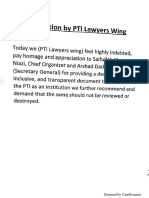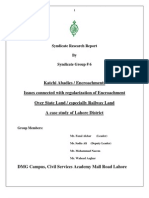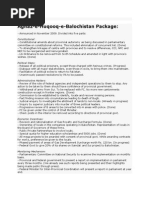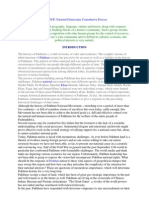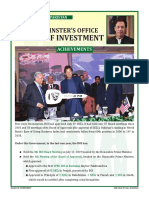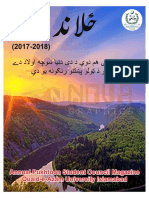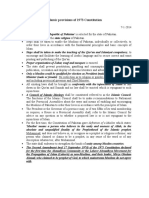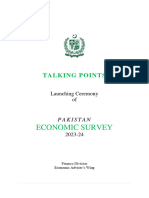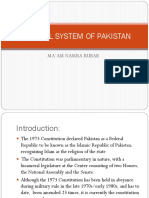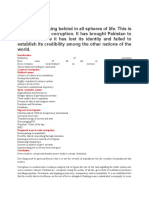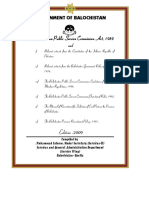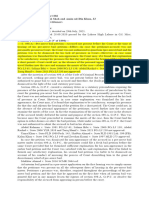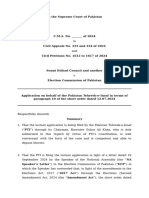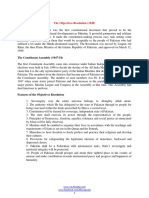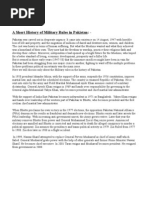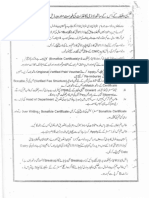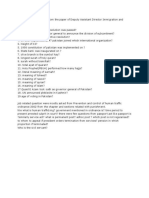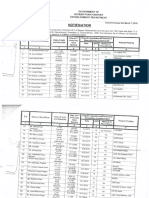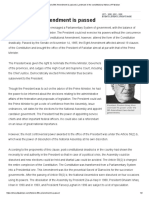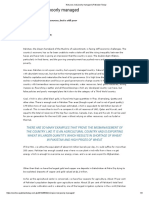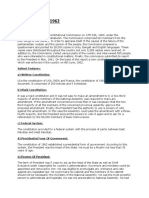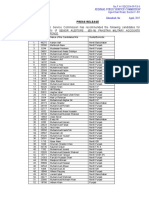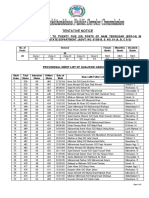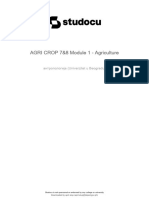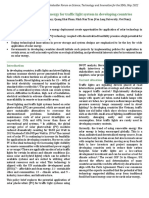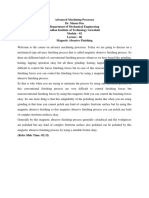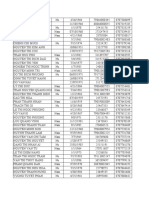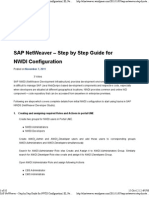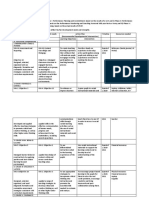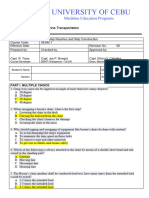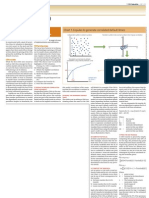0 ratings0% found this document useful (0 votes)
420 viewsGroups of Css Exam Pakistan/ Css Exam Pakistan Posts/Jobs/Vacancies
Groups of Css Exam Pakistan/ Css Exam Pakistan Posts/Jobs/Vacancies
Uploaded by
Jasim WazirThe document provides information on several groups in Pakistan's civil service that are selected through the CSS exam, including:
1. The Police Services of Pakistan, where officers are selected as ASP through CSS and are responsible for law enforcement.
2. The Pakistan Administrative Services, previously known as the District Management Group, which is responsible for district administration and management. Officers can become secretaries of government divisions.
3. The Foreign Services of Pakistan, which is responsible for Pakistan's diplomatic missions abroad. Officers begin their careers in the Ministry of Foreign Affairs and overseas posts.
4. The Pakistan Customs Service, which is responsible for border control and trade regulation. Officers are initially appointed as assistant collectors after the CSS
Copyright:
© All Rights Reserved
Available Formats
Download as PDF, TXT or read online from Scribd
Groups of Css Exam Pakistan/ Css Exam Pakistan Posts/Jobs/Vacancies
Groups of Css Exam Pakistan/ Css Exam Pakistan Posts/Jobs/Vacancies
Uploaded by
Jasim Wazir0 ratings0% found this document useful (0 votes)
420 views1 pageThe document provides information on several groups in Pakistan's civil service that are selected through the CSS exam, including:
1. The Police Services of Pakistan, where officers are selected as ASP through CSS and are responsible for law enforcement.
2. The Pakistan Administrative Services, previously known as the District Management Group, which is responsible for district administration and management. Officers can become secretaries of government divisions.
3. The Foreign Services of Pakistan, which is responsible for Pakistan's diplomatic missions abroad. Officers begin their careers in the Ministry of Foreign Affairs and overseas posts.
4. The Pakistan Customs Service, which is responsible for border control and trade regulation. Officers are initially appointed as assistant collectors after the CSS
Original Title
Css groups
Copyright
© © All Rights Reserved
Available Formats
PDF, TXT or read online from Scribd
Share this document
Did you find this document useful?
Is this content inappropriate?
The document provides information on several groups in Pakistan's civil service that are selected through the CSS exam, including:
1. The Police Services of Pakistan, where officers are selected as ASP through CSS and are responsible for law enforcement.
2. The Pakistan Administrative Services, previously known as the District Management Group, which is responsible for district administration and management. Officers can become secretaries of government divisions.
3. The Foreign Services of Pakistan, which is responsible for Pakistan's diplomatic missions abroad. Officers begin their careers in the Ministry of Foreign Affairs and overseas posts.
4. The Pakistan Customs Service, which is responsible for border control and trade regulation. Officers are initially appointed as assistant collectors after the CSS
Copyright:
© All Rights Reserved
Available Formats
Download as PDF, TXT or read online from Scribd
Download as pdf or txt
0 ratings0% found this document useful (0 votes)
420 views1 pageGroups of Css Exam Pakistan/ Css Exam Pakistan Posts/Jobs/Vacancies
Groups of Css Exam Pakistan/ Css Exam Pakistan Posts/Jobs/Vacancies
Uploaded by
Jasim WazirThe document provides information on several groups in Pakistan's civil service that are selected through the CSS exam, including:
1. The Police Services of Pakistan, where officers are selected as ASP through CSS and are responsible for law enforcement.
2. The Pakistan Administrative Services, previously known as the District Management Group, which is responsible for district administration and management. Officers can become secretaries of government divisions.
3. The Foreign Services of Pakistan, which is responsible for Pakistan's diplomatic missions abroad. Officers begin their careers in the Ministry of Foreign Affairs and overseas posts.
4. The Pakistan Customs Service, which is responsible for border control and trade regulation. Officers are initially appointed as assistant collectors after the CSS
Copyright:
© All Rights Reserved
Available Formats
Download as PDF, TXT or read online from Scribd
Download as pdf or txt
You are on page 1of 1
GROUPS OF CSS EXAM
PAKISTAN/ CSS EXAM
PAKISTAN
POSTS/JOBS/VACANCIES
All Groups of CSS summary
________________________________________
Police Services of Pakistan (PSP):
Definition of Police can be “The civil force of a
federal or local government, responsible for
the prevention and detection of crime and the
maintenance of public order.” Police is the
function of that branch of the administrative
machinery of government which is charged
with the preservation of public order and
tranquility, the promotion of the public health,
safety, and morals, and the prevention,
detection, and punishment of crimes.
In Pakistan Police officers are selected on the
rank of ASP (Assistant Superintendent of
Police) through CSS and then promoted to SP,
SSP, DIG, Addl IG and IG. In Pakistan ASP is
the head of city / sub-division (Tehsil) Police
whose rank is equivalent to DSP but DSPs are
those officers who are promoted from
inspector but ASP is selected directly through
CSS.
It is the most prestigious and honourable job
to serve country through police department.
Police is carried out by several federal and
provincial police agencies. The four provinces
and the Islamabad Capital Territory each have
a civilian police force with jurisdiction
extending only to the relevant province or
territory. At the federal level, there are a
number of civilian agencies with nationwide
jurisdictions including the Federal
Investigation Agency and the National
Highways and Motorway Police, as well as
several paramilitary forces including the
Pakistan Rangers and the Frontier Corps. The
most senior officers of all the civilian police
forces also form part of the Police Service of
Pakistan, which is a component of the civil
service of Pakistan.
Pakistan Administrative Services (PAS) /
District Management Group (DMG):
Pakistan Administrative Service (PAS),
previously known as the District Management
Group (DMG), in May 2012 Prime minister of
Pakistan announced this new name. Having its
roots in the former Civil Service of Pakistan
(CSP), The Indian Civil Service (ICS)—also
known once as Imperial Civil Service,
predecessor of the Civil Service of Pakistan
and District Management Group—was
established by the British to bolster the British
Raj. After Indian independence, the ICS
component ceded to Pakistan was renamed
the Pakistan Administrative Service. Later it
was named the Civil Service of Pakistan. In
1954, an agreement was reached between the
Governor General of Pakistan and the
governors of the provinces to constitute an
All-Pakistan service. Under administrative
reforms of 1973, the name of Civil Service of
Pakistan was changed to All-Pakistan Unified
Group (APUG) of which the PAS and Police
Service of Pakistan are now major
components.
The starting point for the PAS officers at the
district level is the position of Assistant
Commissioner of a subdivision. They are
entrusted with general management,
administration of the State land, revenue
matters, coordination between the
government departments and (except in
Punjab and Sind) law and order.
At senior levels, the PAS Officer can become
Secretary of any of the various federal
government divisions like Commerce and
Trade, Establishment, Housing, Information
Technology etc. Likewise in the provincial
governments they act as Secretaries for
departments such as Education, Health,
Home, Services and General Administration
etc. and as Additional Chief Secretary,
Chairman Planning and Development, and
Chief Secretary. The horizontal mobility of the
PAS officers ensures wide experience and
exposure to the officers who are posted to
various command and staff appointments.
The prospects for promotion are very high
and the promotion of the PAS officers is very
rapid as compared to other occupational
groups. The details are as follows:
Requirement for promotion to:
BS-18: Min 5 years of service termination of
Probation and passing of Deptt. Exam
BS-19: 12 years of service, MCMC and
eligibility score of 60 in PERs
BS-20: 17 years of service, SMC and eligibility
score of 70 in PERs
BS-21: 22 years of service, NMC / NDC and
eligibility score of 70 in PERs
BS-22: Selected from amongst BS-21 officers
of APUG
Foreign Services of Pakistan (FSP):
Foreign Service of Pakistan was formally
created in October 1952, after having been an
improvised organization since the creation of
Pakistan.
After the initial training period, junior officers
join the Ministry of Foreign Affairs, Islamabad
and serve as Assistant Directors in the
political, administrative or protocol wings. The
hierarchy at the Ministry comprises of five
stages:
1) Section Officer
2) Director
3) Director General
4) Additional Foreign Secretary
5) Foreign Secretary
Junior officers begin their diplomatic careers
abroad as either Third Secretary or Vice
Consuls. The hierarchies in Pakistan
Embassies/High Commissions/Permanent
Missions/Consulates abroad comprise six
stages:
1) Third Secretary or Vice Consul
2) Second Secretary
3) First Secretary or Consul
4) Counselor
5) Minister or Consul General
6) Ambassador/High
Commissioner/Permanent Representative
The Foreign Policy of Pakistan is based on
country's commitment to regional and global
peace and security. Pakistan is fully
committed to the Charter of the United
Nations and believes that inter-state relations
should be on the basis of sovereign equality,
mutual respect, non-interference in others
affairs and peaceful settlement of disputes.
Pakistan seeks friendship with all countries of
the world in general and with its neighbours in
particular.
Pakistan is playing an active role in the
international community's efforts to counter
extremism and terrorism and is committed to
eradicating this menace. It has suffered the
most in this struggle in terms of economic and
human loss.
Pakistan is playing a constructive role on
important global issues like non-proliferation
and disarmament, global warming and UNSC
reforms. We attach importance to our
participation in regional forums like SAARC,
SCO, ECO, ARF, and ASEM.
[I]Pakistan Customs Services (PCS):[/I]
Pakistan Customs is the guardian of
Pakistan's borders against movement of
contra band goods and is a facilitator of bona
fide trade. It provides a major source of
revenue to the Government of Pakistan in the
form of taxes levied on the goods traded
across the borders. It also helps to protect the
domestic industry, discourage consumptions
of luxury goods and stimulate development in
the under -developed areas. Customs and
Regulatory duties amount up to 15% of the
total receipts collected by the Federal Board
of Revenue. Pakistan Customs is manned by
officers from the Pakistan Customs Service
(PCS) which has been one of the premier
occupational group amongst Pakistan's civil
services. Previously known as the “Customs &
Excise group”, it was re-classified as Pakistan
Customs Service in November 2010, when the
responsibility of Sales Tax & Federal Excise
was taken away and a new occupational
service developed to collect Sales Tax,
Federal Excise and Income Tax namely Inland
Revenue Service (IRS). This has given PCS
officers an opportunity to focus on their core
function of acting as guardian of the nation’s
borders against illegitimate trade and
regulating bona fide trade. While the role of
Pakistan Customs Service has been greatly
diminished because of the loss of sales tax
and federal excise to IRS, the move has
allowed Pakistan Customs Service to become
a lean and mean service with enhanced focus
on border control.
The anti-smuggling powers delegated
previously by Pakistan Customs to Pakistan
Rangers and FC were withdrawn in view of
expansion of PCS in border regions and now
Pakistan Customs is planning to have an
enhanced anti-smuggling role in border areas
which will allow it to play an important role in
national development. The shift in the role of
Pakistan Customs from a revenue-collection
agency to a border control agency with
substantial responsibility in safe-guarding
country’s trade policies is what appears to be
the future of Pakistan Customs Service.
After CSS officers are appointed on 17th scale
on the post of Assistant collector on the post
of Assistant collector.
Ranks in Pakistan Custom Services are
Member Customs/ Chief Collector
(North/South/Central)
1. Collector of Customs
2. Additional Collector of Customs
3. Deputy Collector of Customs/ Assistant
Collector of Customs
4. Assistant Collector/ Superintendent of
Customs/ Superintendent of Intelligence &
Investigation/ Superintendent of Preventive
Services/ Principal Appraiser
5. Deputy Superintendent of Customs/ Senior
Intelligence Officer/ Senior Preventive Officer/
Appraissing officer
6. Inspector of Customs/ Intelligence Officer/
Inspector Preventive Services/ Examining
Officer
7. Preventive Officer
8. Office Superintendent
9. Head Clerk
10. Wireless Operator
11. Upper Division Clerk
12. Lower Division Clerk
13. Hawaldar/ Kot Gusht
14. Driver
15. Constable
Pakistan Audit and Accounts Service
(PAAS):
The Supreme Audit Institution (SAI) Pakistan
has a long history of being at the centre of
public accountability that goes back to the
19th century when the financial codes and
manual for public financial management in the
region were first drafted. Since the
independence of the country, the SAI Pakistan
enjoys a constitutional status that ensures
independence and continuity of its
operations.
The Auditor General of Pakistan, who is the
head of the Supreme Audit Institution (SAI)
Pakistan, is appointed under Article 168 of the
Constitution of the country. His reports are
laid before the National, Provincial and District
legislatures comprising the elected public
representatives and are considered in the
Public Accounts Committee of the respective
legislatures. His mandate given in the
Constitution of the country and supported by
subsidiary legislation enables him to develop
independent and objective assessments of
the process of governance which augment
the legislative oversight of the people's
representatives on governmental operations.
The SAI Pakistan carries out the following
audit activities in accordance with the
INTOSAI auditing standards and international
best practices:
Financial Attest provided by the SAI Pakistan
covers a very broad range of governmental
operations. There are three tiers of
government (Federal, Provincial and District)
and three types of organizations (those on the
central accounting network, self-accounting
entities budgeted by the government and
public sector entities). Financial attest is
provided at all tiers and for all categories,
except those entities whose accounts are, by
law, auditable by private sector auditors.
Regularity and Compliance Audits of
expenditure and revenue receipts are
conducted under roll over planning for all
organizations at all tiers.
Performance Audits focus on the outcomes of
various projects and programmes with special
emphasis on social sectors.
Special Studies are initiated on matters of
pressing importance or urgency which are of
significant public interest.
Training, Research and Publications are the
main tools of the SAI Pakistan to keep abreast
of the developments in the profession. It has a
network of training establishments spread
across the country, where public servants are
trained in auditing, accounting and financial
management. Its research operations have
produced a Financial Audit Manual, an
internationally recognized Financial Audit
Methodology with 16 sector-specific
Guidelines and a series of Research Papers.
Performit – a quarterly magazine published by
the SAI Pakistan – is known in the state
auditing circles for its quality.
The Auditor General's organization is the only
institution mandated by the Constitution to
support parliamentary oversight over the
raising and utilization of public financial
resources. In this capacity, the Auditor
General plays a key role in ensuring
accountability and transparency in the
governmental operations.
The budget of the Auditor General is classified
as "charged" expenditure which is discussed
in the Parliament but not voted upon. This
arrangement provides the Supreme Audit
Institution (SAI) a considerable degree of
independence. About 1500 qualified officers
assist the Auditor General in the discharge of
his responsibilities. The SAI Pakistan is an
equal opportunity employer.
The Auditor General’s organization is the
prime institution in the country for ensuring
public accountability and fiscal transparency
in governmental operations. The organization
is expected to bring about improvements in
the financial discipline and internal control
environment in the executive departments for
minimizing the possibility of waste and fraud.
Commerce & Trade Group (PCG):
Consequent upon the introduction of
administrative reforms of 1973, aiming to
create civil Services of specialized nature and
responsibilities; the Trade Service of Pakistan,
created in 1967, was changed into Commerce
and Trade Group. The officers of Commerce
and Trade are entrusted with the
responsibility of trade promotion, facilitation,
regulation and development through different
organizations and Pakistan's commercial
missions abroad. The total number of officers
in the group is 266.
The officers of Commerce and Trade Group
are posted mainly in Ministry of Commerce
and its attach departments which include
Trade Development Authority of Pakistan
(TDAP), Pakistan Institute of Trade and
Development (PITAD), Directorate General of
Trade Organizations (DGTO), Trade
Corporation of Pakistan (TCP), National Tariff
Commission (NTC) and different insurance
organizations. Moreover, their services are
also requisited by the ministries dealing with
trade and economy such as Ministry of
Finance, Ministry of Industry, Ministry of
Textile, Ministry of Investment, and Economic
Affairs Division and so on.
The Commerce and Trade Group Officers
have the role of career commercial diplomats.
They are posted in Pakistan commercial
missions abroad (presently 62 missions) right
from Commercial Secretary to the position of
Trade Minister.
The Commerce and Trade officers are paid
standard salary ,perks & privileges as
determined for each
BPS by the Federal Government .
Ranks in Commerce and Trade Group after
passing CSS are:
Assistant Director BS 17
Commercial Secretary BS 18
Commercial Counselor BS19
Consul General BS 20
Minister ( Economic or trade ) BS 21
Income Tax group (ITG):
The Federal Board of Revenue (FBR) was
created on April 1, 1924 through enactment of
the Federal Board of Revenue Act, 1924. In
1944, a full-fledged Revenue Division was
created under the Ministry of Finance. After
independence, this arrangement continued up
to 31 August 1960 when on the
recommendations of the Administrative Re-
organization Committee, FBR was made an
attached department of the Ministry of
Finance. In 1974, further changes were made
to streamline the organization and its
functions. Consequently, the post of
Chairman FBR was created with the status of
ex-officio Additional Secretary and Secretary
Finance was relieved of his duties as ex-
officio Chairman of the FBR.
By the enactment of FBR Act 2007 in July
2007 the Central Board of Revenue has now
become Federal Board of Revenue. The status
of FBR as Revenue Division has again been
restored.
Income Tax Department is the wing of the
Revenue Division (CBR) dealing with the
collection of direct taxes, i.e. Income Tax and
Wealth Tax. Very few people know about the
specialized nature of the income tax work and
the dedication and the hard work it demands.
In recent times, there has been a lot of
attention on the financial services in the
structure of civil bureaucracy. Revenue
collection is, by its very nature, an important
job and with the ever diminishing foreign aid,
the importance of tax collection is now being
appreciated by everyone.
Income Tax Department is in the throes of
change these days. The business processes,
procedures and hierarchy is being remodeled
to change the Department to a tax friendly,
responsive and efficient organization. This
restructuring also involves the reengineering
of recruitment process, there is also focus on
the implementation of information technology.
The Central Board of Revenue is probably the
first government department to have a full-
fledged Human Resource Wing with a senior
person, of the level of member, heading it.
There is considerable focus on evaluating the
in vogue business procedures, in fact, the
present restructuring is aimed at a complete
re-engineering of the business process of
revenue collection. In a few years time, this
Department will have evolved into an efficient
tax friendly organization with a lean but highly
trained and motivated workforce.
As a part of this strategy, model tax offices
have been created at Karachi and Lahore for
one or two classes of taxpayers. Further
reforms will take into account, the experience
gained during the operation of these pilot
projects etc. As can be inferred from the
focus and emphasis on the restructuring of
the Income Tax and Sales Tax Departments,
the Government is committed to bring about a
positive change in the way the taxpayer and
the tax collector interact and perceive each
other.
Already there are indications that the Income
Tax Group has moved up to number 2 or 3 in
the priority list of the candidates aspiring to
enter the prestigious civil service of Pakistan.
Information Group (IG)
Like other Occupational Groups of the Central
Superior Services (CSS), the Information
Group plays a vital role in national image
building within and abroad. After the
completion of Common Training Programme
at the Civil Services Academy, Lahore, the
probationers join Information Services
Academy in Islamabad with a view to
acquiring specialized training in media
management and public relations. On
completion of specialized training, these
officers are posted in (1) Press Information
Department (PID) (2) External Publicity Wing
(EP Wing) (3) Internal Publicity Wing (4) ABC
(5) Directorate of Films and Publications
(DFP), (6) Cyber Wing etc in the Ministry of
Information & Broadcasting.
You might also like
- New Icpo Cif Oi̇l Company Icpo - Jet A1 Fuel Cif 04042024Document4 pagesNew Icpo Cif Oi̇l Company Icpo - Jet A1 Fuel Cif 04042024sales100% (5)
- Case No. 9 Laying Out Arnold Palmer Hospital's New FacilityDocument2 pagesCase No. 9 Laying Out Arnold Palmer Hospital's New Facilityfer cagsNo ratings yet
- Theconstitution Pakistan Muslim League - NDocument30 pagesTheconstitution Pakistan Muslim League - NAhmad AzharNo ratings yet
- Awami National Party Manifesto 2008 (English)Document7 pagesAwami National Party Manifesto 2008 (English)Awami National Party100% (1)
- Resolution by PTI Lawyers Wing - Complete DocumentDocument12 pagesResolution by PTI Lawyers Wing - Complete DocumentInsaf.PK67% (3)
- Katchi Abadis As Encroachments Over Railways Land in LahoreDocument53 pagesKatchi Abadis As Encroachments Over Railways Land in LahoreFazal Akbar100% (1)
- Categorization of The Department 2Document92 pagesCategorization of The Department 2Abdul HadiNo ratings yet
- Vodacom and MTNDocument21 pagesVodacom and MTNajootun68190% (1)
- Certification of Fda RegistrationDocument1 pageCertification of Fda RegistrationemNo ratings yet
- Imran Khan - PTI Leadership - Financial Asset DeclarationDocument5 pagesImran Khan - PTI Leadership - Financial Asset DeclarationPTI Official100% (2)
- Final Proposed PTI Constitution 2019Document105 pagesFinal Proposed PTI Constitution 2019Insaf.PK86% (7)
- The Punjab Delegation of Financial Powers RulesDocument51 pagesThe Punjab Delegation of Financial Powers Rulesali adnanNo ratings yet
- Pak Gov DataDocument457 pagesPak Gov DataChaudhary Muhammad Suban Tasir100% (1)
- Aghaz e Haqooq BaluchustanDocument2 pagesAghaz e Haqooq BaluchustanShahabAhmad100% (1)
- Complete Transcript of Donald Lu HearingDocument22 pagesComplete Transcript of Donald Lu HearingAnonymous qjccOiLnNo ratings yet
- Federal Ombudsman of Pakistan Complaints Resolution Mechanism For Overseas PakistanisDocument41 pagesFederal Ombudsman of Pakistan Complaints Resolution Mechanism For Overseas PakistanisWaseem KhanNo ratings yet
- PakhtunkhwadevelopmentDocument69 pagesPakhtunkhwadevelopmentQissa KhwaniNo ratings yet
- Constitutional Development of Pakistan Since 1947 To TheDocument9 pagesConstitutional Development of Pakistan Since 1947 To TheMuhammad Saleem SulehriNo ratings yet
- First Year Performance of PTI Govt 2018-19Document82 pagesFirst Year Performance of PTI Govt 2018-19Insaf.PK100% (1)
- FAFEN Preliminary Report On Observation of GE 2024 1Document9 pagesFAFEN Preliminary Report On Observation of GE 2024 1uswah zahidNo ratings yet
- BS-21 Seniority List 01 - 01 - 2022Document2 pagesBS-21 Seniority List 01 - 01 - 2022Moazam KhanNo ratings yet
- Pushtoon Students Council QAU Islamabad.Document20 pagesPushtoon Students Council QAU Islamabad.Murad KhanNo ratings yet
- Islamic Provisions of 1973 ConstitutionDocument1 pageIslamic Provisions of 1973 ConstitutionsabirfurqanNo ratings yet
- Talking Points For Launching Ceremony of Pakistan Economic Survey 2023-24Document13 pagesTalking Points For Launching Ceremony of Pakistan Economic Survey 2023-24anees rehmanNo ratings yet
- Constitution 1973Document3 pagesConstitution 1973mrtweetsNo ratings yet
- Circular: Government of Pakistan Cabinet Secretariat Establishment DivisionDocument6 pagesCircular: Government of Pakistan Cabinet Secretariat Establishment DivisionzeeshanNo ratings yet
- Political System of PakistanDocument18 pagesPolitical System of PakistanNaufil AmirNo ratings yet
- National Reconciliation Ordinance (NRO)Document1 pageNational Reconciliation Ordinance (NRO)VVaasseem KhhaanNo ratings yet
- PTI Proposed Amended Constitution 2014Document62 pagesPTI Proposed Amended Constitution 2014PTI OfficialNo ratings yet
- Corruption in PakistanDocument12 pagesCorruption in Pakistankeil wertyNo ratings yet
- Salient Features of 1956, 1962, 1973 ConstitutionDocument10 pagesSalient Features of 1956, 1962, 1973 ConstitutionSaad Khan100% (1)
- Css Result 2006-Written & FinalDocument12 pagesCss Result 2006-Written & FinalAfra Siyab KhanNo ratings yet
- Khawaja NazimuddinDocument11 pagesKhawaja NazimuddinAziz0346100% (2)
- Balochistan Public Service Commission Act 1989Document214 pagesBalochistan Public Service Commission Act 1989Shahar FaiziNo ratings yet
- Transfer Posting Orders (16.02.2023)Document7 pagesTransfer Posting Orders (16.02.2023)zakadurraniNo ratings yet
- P L D 2021 Supreme Court 886Document4 pagesP L D 2021 Supreme Court 886Muhammad Bin MohsinNo ratings yet
- From Hon. Speaker To CECDocument3 pagesFrom Hon. Speaker To CECjahanzaib yasinNo ratings yet
- Qazilbash Waqf CaseDocument38 pagesQazilbash Waqf Casecrematedwolf50% (2)
- App For Clarification - 80 MNAs-Draft.BDocument6 pagesApp For Clarification - 80 MNAs-Draft.BgeowebdeskNo ratings yet
- KPKDocument15 pagesKPKAyan NoorNo ratings yet
- The Objectives Resolution (1949)Document2 pagesThe Objectives Resolution (1949)Kainat Nawaz100% (1)
- The 1962 ConstitutionDocument3 pagesThe 1962 Constitutionibnulwaqt86% (14)
- Military Rule in PakistanDocument19 pagesMilitary Rule in PakistanMuhammad shahbaz86% (22)
- Pakistan Bait Ul Mal Scholarship FormDocument5 pagesPakistan Bait Ul Mal Scholarship Formumar farooqNo ratings yet
- Anita Turab PDFDocument28 pagesAnita Turab PDFMasood BhattiNo ratings yet
- Imran Khan A Hope For NationDocument9 pagesImran Khan A Hope For NationzeeNo ratings yet
- Pak Study PresentationDocument14 pagesPak Study PresentationDaud SajidNo ratings yet
- Pakistan From 1947-58Document19 pagesPakistan From 1947-58Shukran MaryamNo ratings yet
- These Are Few Questions From The Paper of Deputy Assistant Director Immigration and Passport Held TodayDocument1 pageThese Are Few Questions From The Paper of Deputy Assistant Director Immigration and Passport Held Todayfaraz azizNo ratings yet
- Major Problems Facing Pakistan TodayDocument7 pagesMajor Problems Facing Pakistan TodayJiyaBeboNo ratings yet
- Final Seniority List Privincial Management Service (BS-18) PDFDocument10 pagesFinal Seniority List Privincial Management Service (BS-18) PDFibrahim khanNo ratings yet
- KPPSC PMS Past Paper Screening Test Mcqs 2016Document8 pagesKPPSC PMS Past Paper Screening Test Mcqs 2016Arif khan100% (2)
- Historic 8th Amendment Is Passed - Landmark in The Constitutional History of PakistanDocument2 pagesHistoric 8th Amendment Is Passed - Landmark in The Constitutional History of PakistanHamza Azhar100% (1)
- Not Poor, But Poorly Managed - Pakistan TodayDocument3 pagesNot Poor, But Poorly Managed - Pakistan TodayAitzazNo ratings yet
- Amendments To The Constitution of Pakistan - WikipediaDocument12 pagesAmendments To The Constitution of Pakistan - WikipediaMehran HaloNo ratings yet
- Constitution of 1962Document3 pagesConstitution of 1962Maria MalikNo ratings yet
- Presidential or Parliamentary System in PakistanDocument5 pagesPresidential or Parliamentary System in PakistanKhalid Latif KhanNo ratings yet
- PATTOKIDocument2 pagesPATTOKIUsama khanNo ratings yet
- F.4-150-2014 - Senior Auditor - 11-04-2017 - FSDocument11 pagesF.4-150-2014 - Senior Auditor - 11-04-2017 - FSHaider ShahNo ratings yet
- Merit List NT Naib Tehsildar Advt 07-2018-MeritDocument4 pagesMerit List NT Naib Tehsildar Advt 07-2018-MeritLooqman KhanNo ratings yet
- Martial Laws in Pakistan With Dates and NamesDocument7 pagesMartial Laws in Pakistan With Dates and Nameszulqurnain gujjarNo ratings yet
- Ace CSS ProspectusDocument22 pagesAce CSS Prospectusnailawahid3300No ratings yet
- All Groups of CSS SummaryDocument9 pagesAll Groups of CSS SummaryNida NaeemNo ratings yet
- Tle G8-Epas Q1 M1 NewDocument29 pagesTle G8-Epas Q1 M1 NewAaron AnsaldoNo ratings yet
- Token Payments Field DescriptionDocument22 pagesToken Payments Field DescriptionngohuynhnguyenNo ratings yet
- Feb 7 Homework Solutions Math 151, Winter 2012 Chapter 4 Problems (Pages 172-179)Document8 pagesFeb 7 Homework Solutions Math 151, Winter 2012 Chapter 4 Problems (Pages 172-179)Pei JingNo ratings yet
- Vulkanox 3100: IdentificationDocument3 pagesVulkanox 3100: IdentificationMarcos ROSSINo ratings yet
- Agri Crop 78 Module 1 AgricultureDocument36 pagesAgri Crop 78 Module 1 AgricultureAprilNo ratings yet
- Maximum PCDocument100 pagesMaximum PCJohn100% (1)
- c1 MGMT InfoDocument9 pagesc1 MGMT InfoZulaikha ShamNo ratings yet
- Chapter 1 Differing Perspectives On Quality - Revision1Document20 pagesChapter 1 Differing Perspectives On Quality - Revision1Moon2803No ratings yet
- 1902-0213 - en TIGHTENING TORQUES FOR TYPE 4 ENGINESDocument28 pages1902-0213 - en TIGHTENING TORQUES FOR TYPE 4 ENGINESLuis PupialesNo ratings yet
- 2.4.10-19-Ha-Solar Energy For Traffic LightsDocument8 pages2.4.10-19-Ha-Solar Energy For Traffic LightsGokul SNo ratings yet
- Vineet SoamCVDocument2 pagesVineet SoamCVMANISH SARASWATNo ratings yet
- AOS-SSwitch16 11 0018RNDocument45 pagesAOS-SSwitch16 11 0018RNAdrian TrejosNo ratings yet
- Lec6 PDFDocument27 pagesLec6 PDFSANJAY KUMAR YADAV MtechNo ratings yet
- Balancing & Flow Control Valves PDFDocument47 pagesBalancing & Flow Control Valves PDFNoushad P Hamsa100% (3)
- Srs TemplateDocument10 pagesSrs TemplateDeepak PardhiNo ratings yet
- 1K HSBCDocument75 pages1K HSBCthanh lộcNo ratings yet
- 226 Step by Step Guide For NWDI Configuration - EL Netweaver)Document10 pages226 Step by Step Guide For NWDI Configuration - EL Netweaver)Sudheer KoppalaNo ratings yet
- Part Iv: Development Plans: 1.Kindergarten-Janice G. ParedesDocument7 pagesPart Iv: Development Plans: 1.Kindergarten-Janice G. ParedesRodnel Moncera100% (2)
- Daftar Pustaka AfegaDocument3 pagesDaftar Pustaka Afeganendry11No ratings yet
- A Realistic Candy Bar in IllustratorDocument22 pagesA Realistic Candy Bar in IllustratorkimberlyNo ratings yet
- AA - How To Install JLINK For Creo ParametricDocument3 pagesAA - How To Install JLINK For Creo Parametricfareed majeedNo ratings yet
- Q12 Rigging and Unrigging of Bosins Chair Stage and Pilot LadderDocument2 pagesQ12 Rigging and Unrigging of Bosins Chair Stage and Pilot Ladderuyawakoko100% (1)
- Pricing of A CDODocument2 pagesPricing of A CDOJasvinder Josen100% (1)
- Vacuum Emulsifier SatDocument13 pagesVacuum Emulsifier Satdedo4040No ratings yet
- CSC Job Portal: Mgo Calumpit, Bulacan - Region IiiDocument1 pageCSC Job Portal: Mgo Calumpit, Bulacan - Region IiimacNo ratings yet
- Chemistry Bullseye ChartsDocument1 pageChemistry Bullseye ChartsBaloo Nick CastlesNo ratings yet




